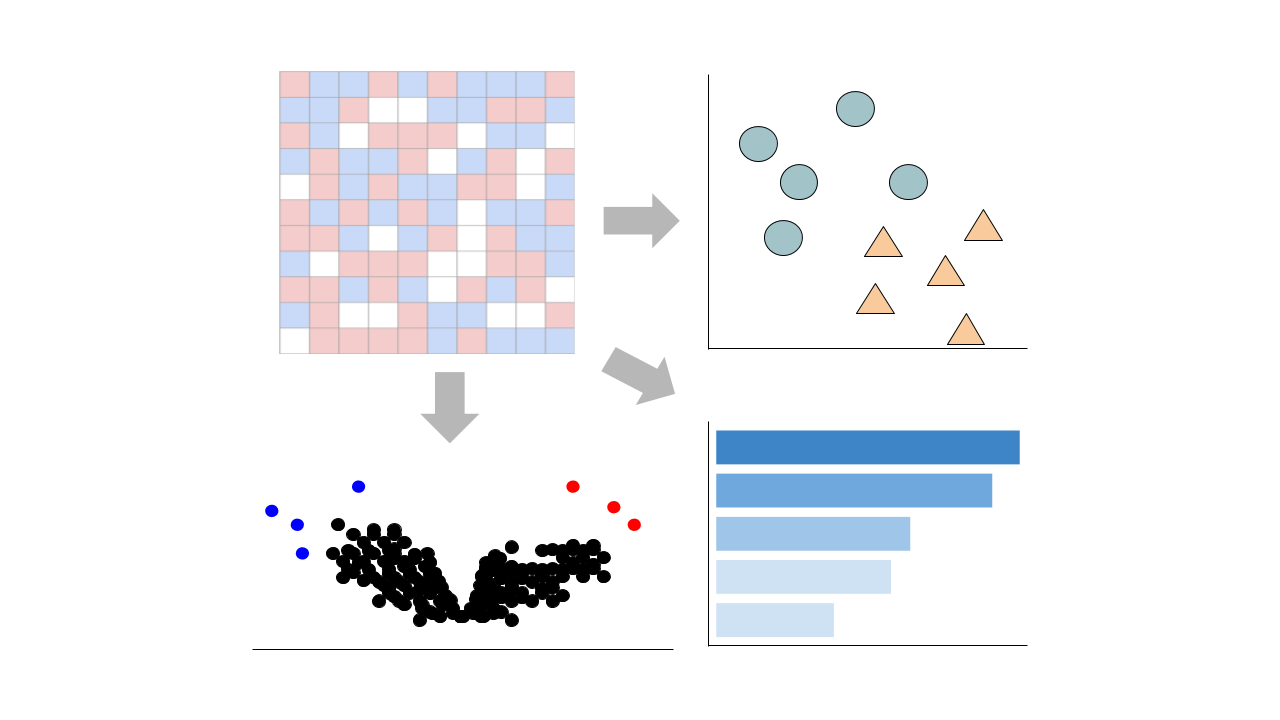 Gene counts are sourced from ARCHS4, which provides uniform alignment of GEO samples.
You can learn more about ARCHS4 and its pipeline here.
Gene counts are sourced from ARCHS4, which provides uniform alignment of GEO samples.
You can learn more about ARCHS4 and its pipeline here.
Select conditions below to toggle them from the plot:
| GROUP | CONDITION | SAMPLES |
|---|---|---|
| Pancreatic islets |
GSM1660657 GSM1660658 GSM1660659
|
|
|
GSM1660660 GSM1660661 GSM1660662
|
Submission Date: Apr 17, 2015
Summary: The short chain fatty acid (SCFA) receptor (free fatty acid receptor-3; FFAR3) is expressed in pancreatic beta cells; however, its role in insulin secretion is not clearly defined. Here, we examined the role of FFAR3 in insulin secretion. Using islets from global knockout FFAR3 (Ffar3-/-) mice, we explored the role of FFAR3 and ligand-induced FFAR3 signaling on glucose stimulated insulin secretion. RNA sequencing was also performed to gain greater insight into the impact of FFAR3 deletion on the islet transcriptome. First exploring insulin secretion, it was determined that Ffar3-/- islets secrete more insulin in a glucose-dependent manner as compared to wildtype (WT) islets. Next, exploring its primary endogenous ligand, propionate, and a specific agonist for FFAR3, signaling by FFAR3 inhibited glucose-dependent insulin secretion, which occurred through a Gαi/o pathway. To help understand these results, transcriptome analyses by RNA-sequencing of Ffar3-/- and WT islets observed multiple genes with well known roles in islet biology to be altered by genetic knockout of FFAR3. Our data shows that FFAR3 signaling mediates glucose stimulated insulin secretion through Gαi/o sensitive pathway. Future studies are needed to more rigorously define the role of FFAR3 by in vivo approaches.
GEO Accession ID: GSE67991
PMID: 26091414
Submission Date: Apr 17, 2015
Summary: The short chain fatty acid (SCFA) receptor (free fatty acid receptor-3; FFAR3) is expressed in pancreatic beta cells; however, its role in insulin secretion is not clearly defined. Here, we examined the role of FFAR3 in insulin secretion. Using islets from global knockout FFAR3 (Ffar3-/-) mice, we explored the role of FFAR3 and ligand-induced FFAR3 signaling on glucose stimulated insulin secretion. RNA sequencing was also performed to gain greater insight into the impact of FFAR3 deletion on the islet transcriptome. First exploring insulin secretion, it was determined that Ffar3-/- islets secrete more insulin in a glucose-dependent manner as compared to wildtype (WT) islets. Next, exploring its primary endogenous ligand, propionate, and a specific agonist for FFAR3, signaling by FFAR3 inhibited glucose-dependent insulin secretion, which occurred through a Gαi/o pathway. To help understand these results, transcriptome analyses by RNA-sequencing of Ffar3-/- and WT islets observed multiple genes with well known roles in islet biology to be altered by genetic knockout of FFAR3. Our data shows that FFAR3 signaling mediates glucose stimulated insulin secretion through Gαi/o sensitive pathway. Future studies are needed to more rigorously define the role of FFAR3 by in vivo approaches.
GEO Accession ID: GSE67991
PMID: 26091414
Visualize Samples
 Visualizations are precomputed using the Python package scanpy on the top 5000 most variable genes.
Visualizations are precomputed using the Python package scanpy on the top 5000 most variable genes.
Precomputed Differential Gene Expression
 Differential expression signatures are automatically computed using the limma R package.
More options for differential expression are available to compute below.
Differential expression signatures are automatically computed using the limma R package.
More options for differential expression are available to compute below.
Signatures:
Select conditions:
Control Condition
Perturbation Condition
Only conditions with at least 1 replicate are available to select
 Differential expression signatures can be computed using DESeq2 or characteristic direction.
Differential expression signatures can be computed using DESeq2 or characteristic direction.
This pipeline enables you to analyze and visualize your bulk RNA sequencing datasets with an array of downstream analysis and visualization tools. The pipeline includes: PCA analysis, Clustergrammer interactive heatmap, library size analysis, differential gene expression analysis, enrichment analysis, and L1000 small molecule search.

 Chatbot
Chatbot Single Gene Queries
Single Gene Queries
 Gene Set Queries
Gene Set Queries
 Bulk Studies
Bulk Studies
 Single Cell Studies
Single Cell Studies
 Hypotheses
Hypotheses
 Resources
Resources
 Contribute
Contribute
 Downloads
Downloads About
About
 Help
Help